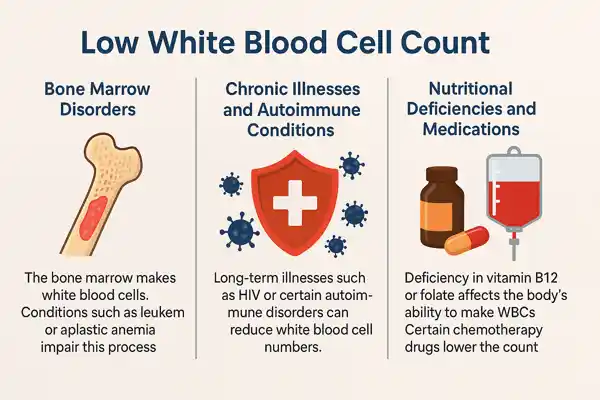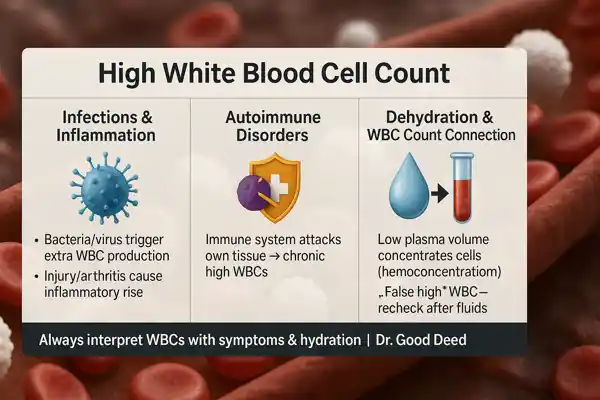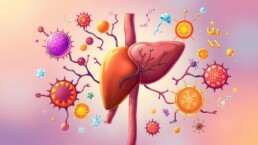Understanding White Blood Cells and Their Role
What are White Blood Cells?
White blood cells function as the defenders of the human body. They travel through the bloodstream, scanning for germs and harmful substances. Without them, even small infections could turn dangerous. They are constantly produced in the bone marrow and are a vital part of our survival.
Table of Contents
ToggleTypes of White Blood Cells and Their Functions
Each type of white blood cell has a precise role:
- Neutrophils: account for about 60 percent of WBCs and are the primary responders to bacterial infections. If you get a cut that becomes red and swollen, neutrophils are already working there.
- Lymphocytes: comprise B cells that generate antibodies and T cells that target infected cells. They provide lasting immunity; for example, once you recover from chickenpox, lymphocytes remember it.
- Monocytes: clean up dead cells and germs. After an infection, they help reduce damage by clearing debris.
- Eosinophils: are active in allergic reactions like asthma and fight parasites. If you suffer from seasonal allergies, eosinophils are partly responsible for your sneezing.
- Basophils: release histamine, which causes inflammation. They play a role in allergic responses.
How White Blood Cells Support the Immune System
White blood cells coordinate attacks on infections. They interact with one another through chemical signals.
For example, during flu, WBCs not only attack the virus but also alert the body to raise temperature, creating fever. This shows how closely WBC activity is tied to illness symptoms.
Normal White Blood Cell Count Range
What is a Normal White Blood Cell Count?
A normal white blood cell count is between 4,000 and 11,000 cells per microliter of blood. This range shows balance: enough cells to protect, but not too many to harm healthy tissues.
Factors That Influence WBC Levels
White blood cell counts fluctuate naturally. Stress before a blood test may cause a temporary rise. Exercise can boost levels too. Steroid medications often raise counts, while some antibiotics lower them.
Conditions such as autoimmune disorders also affect levels, sometimes raising, sometimes lowering them.
Causes of High White Blood Cell Count
Infections and Inflammation
The most common cause of a high white blood cell count is infection. When bacteria or viruses invade, the body produces extra WBCs. Inflammation caused by arthritis or injury also raises counts because the body treats inflammation much like an infection.
Autoimmune Disorders and Immune Response
In autoimmune disorders, the immune system mistakenly attacks healthy tissues. Conditions such as rheumatoid arthritis keep the immune system on high alert, leading to increased WBC production.
This constant response explains why patients with autoimmune disease often show abnormal results on a blood test.
Dehydration and White Blood Cell Count Connection
Patients often find dehydration and white blood cell count to be confusing. Low fluid levels reduce the liquid part of blood, concentrating cells. This is called hemoconcentration due to dehydration.
In this situation, the actual number of WBCs is not higher, but the test suggests a false high WBC count. Doctors must evaluate other signs before assuming infection.
Causes of Low White Blood Cell Count

Bone Marrow Disorders
The bone marrow makes white blood cells. Conditions such as leukemia or aplastic anemia impair this process, resulting in a reduced white blood cell count. These conditions may require advanced treatments like bone marrow transplants.
Chronic Illnesses and Autoimmune Conditions
Long-term illnesses such as HIV or certain autoimmune disorders can reduce white blood cell numbers. The immune system either destroys its own WBCs or prevents them from functioning properly.
Nutritional Deficiencies and Medications
Deficiency in vitamin B12 or folate affects the body’s ability to make WBCs. Certain chemotherapy drugs target fast-growing cells, which include white blood cells, lowering the count as a side effect.
Symptoms of Abnormal White Blood Cell Count
Signs of High White Blood Cell Count
Symptoms include fever, chills, persistent tiredness, and swelling in specific areas. These signs suggest the immune system is overactive, often because it is fighting infection or inflammation.
Signs of Low White Blood Cell Count
A low white blood cell count leaves the body vulnerable. Frequent infections, mouth sores, night sweats, and extreme fatigue are typical warning signs. Even minor colds may become severe.
Dehydration Symptoms and Warning Signs
Dehydration symptoms often appear quickly. Dry mouth, dizziness, dark-colored urine, and headaches are early indicators. Severe cases may cause confusion, fainting, or rapid heartbeat. This thickening of blood is linked with dehydration blood viscosity.
Diagnosing White Blood Cell Abnormalities
Complete Blood Count (CBC) Test
Doctors use a complete blood count to measure all types of blood cells. A complete blood count test yields detailed information about white blood cells, red blood cells, and platelets. This test is standard for diagnosing blood-related issues.
Understanding CBC Results for WBC Levels
Interpreting CBC requires context. A raised WBC level may not always mean infection. In some cases, dehydration complicates results, a process called dehydration lab test interpretation. Doctors compare results with patient history and symptoms to avoid mistakes.
Managing High or Low White Blood Cell Count

Treating Underlying Causes
The key is addressing the root problem. Bacterial infections may need antibiotics, while viral infections require supportive care. Bone marrow problems may demand stronger interventions.
Medications and Immune Support
Drugs that stimulate bone marrow can help patients with low white blood cell count. Immunosuppressants may be prescribed when the immune system is overly active in autoimmune conditions.
Lifestyle Changes for Balanced Immunity
Healthy habits maintain balance. Eating vitamin-rich foods, staying active, sleeping well, and managing stress support immunity. Patients are also advised to stay hydrated, as fluids support blood balance and prevent electrolyte imbalance and WBC changes.
The Role of Hydration in White Blood Cell Balance
How Dehydration Affects the Immune System?
The connection between dehydration and immune system performance is robust. When fluids are low, oxygen and nutrients travel slower.
Waste removal is also delayed, weakening defenses. Dehydration reduces blood plasma volume and dehydration effects cause white blood cell levels to appear abnormal.
Staying Hydrated: Tips and Recommendations
Practical ways to stay hydrated:
- Drink water before feeling thirsty.
- Include water-rich fruits like cucumber and watermelon.
- Replace fluids lost in exercise with water or electrolyte drinks.
- Limit caffeine and alcohol as they increase fluid loss.
When to Seek Medical Attention?
Persistent Abnormal CBC Results
If a complete blood count check repeatedly shows abnormal WBC results, seek medical help. Doctors must rule out infections, bone marrow conditions, or autoimmune diseases. Abnormal results should not be ignored.
Severe Dehydration and Immune Dysfunction
Severe dehydration can cause serious dehydration clinical symptoms such as fainting, low blood pressure, and rapid heart rate. This can weaken the immune system and requires urgent care.
Dehydration and White Blood Cell Count: Expert Insights from Dr. Good Deed
Dr. Good Deed explains that many patients worry when they see a high white blood cell count. In reality, the rise could be from dehydration, not infection. Doctors often repeat the test after rehydration.
To confirm infection, they check inflammation markers and dehydration results together. Drinking water can sometimes make lab reports look normal within hours.
FAQs
Can dehydration affect your white blood cell count?
Yes, dehydration and white blood cell count are linked because low fluid levels concentrate blood and can falsely elevate test results.
What does dehydration do to a CBC?
Dehydration causes thicker blood, leading to a false high WBC count on a complete blood count test.
What are the lab signs of dehydration?
Signs include high sodium, thickened blood from dehydration, blood viscosity, and concentrated red and white cells.
What happens to blood cells when you are dehydrated?
They receive less oxygen, nutrient delivery slows, and counts look higher due to concentration.
What can be mistaken for dehydration?
Heatstroke, infection, and low blood pressure may resemble dehydration, making diagnosis tricky.
What are the symptoms of electrolyte imbalance?
Muscle weakness, cramps, confusion, and irregular heartbeat often indicate an electrolyte problem.
Can dehydration affect hemoglobin levels?
Yes, it can. Less fluid makes hemoglobin appear higher, though actual red cell numbers do not increase.

This article is medically reviewed by Dr. Chandril Chugh, Board-Certified Neurologist, providing expert insights and reliable health information.
Dr. Chandril Chugh is a U.S.-trained neurologist with over a decade of experience. Known for his compassionate care, he specializes in treating neurological conditions such as migraines, epilepsy, and Parkinson’s disease. Dr. Chugh is highly regarded for his patient-centered approach and dedication to providing personalized care.








